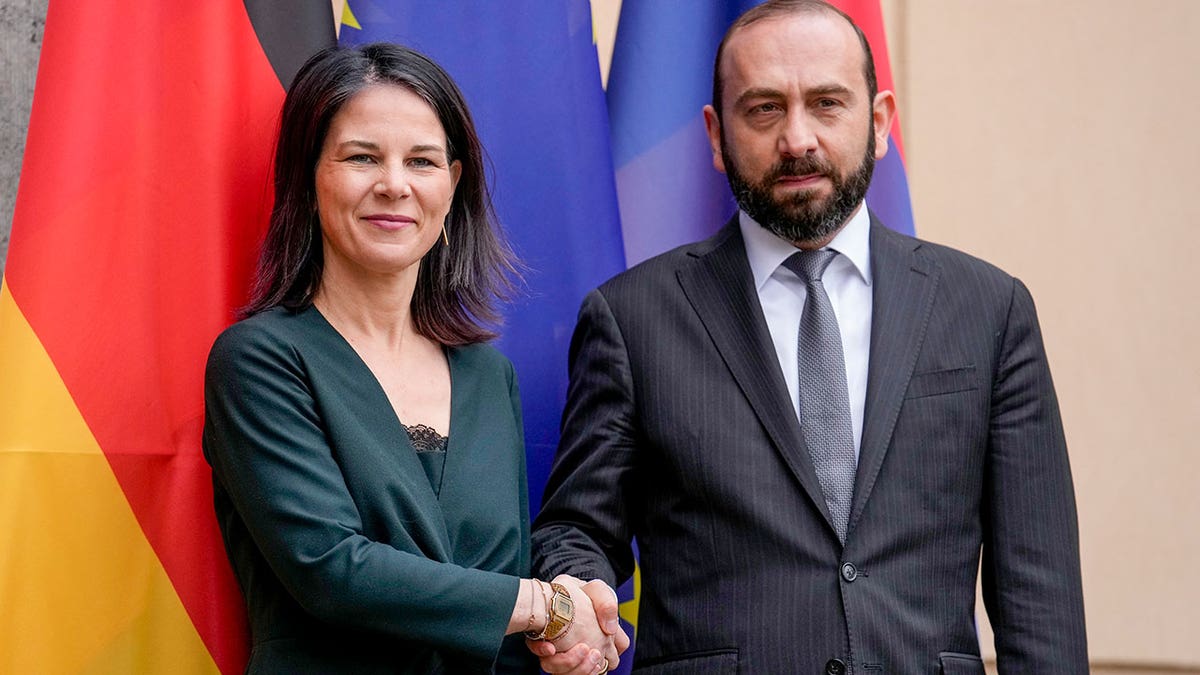US, Australia, Japan, Germany show force during military exercise amid China fears
Fox News chief national security correspondent Jennifer Griffin reports on the joint military drills in Shoalwater Bay, Australia to send a message to China.
- Germany facilitated talks on a peace treaty between Armenia and Azerbaijan on Wednesday, welcoming their foreign ministers to Berlin.
- The talks followed a meeting on Feb. 17 involving German Chancellor Olaf Scholz, Armenian Prime Minister Nikol Pashinyan, and Azerbaijani President Ilham Aliyev.
- Armenia and Azerbaijan have pledged to work toward signing a treaty.
Germany sought to move forward talks on a peace treaty between Armenia and Azerbaijan on Wednesday, welcoming the two countries' foreign ministers to Berlin.
German Foreign Minister Annalena Baerbock hosted her counterparts, Armenia's Ararat Mirzoyan and Azerbaijan's Jeyhun Bayramov, at a secluded government villa for what was billed as two days of talks.
The latest talks followed a meeting on Feb. 17 between German Chancellor OIaf Scholz, Armenian Prime Minister Nikol Pashinyan and Azerbaijani President Ilham Aliyev on the sidelines of the Munich Security Conference. Scholz underlined Germany's willingness to help conclude peace talks, along with that of European Council President Charles Michel.
GERMANY AND POLAND RULE OUT SENDING TROOPS TO UKRAINE AS TENSIONS WITH RUSSIA ESCALATE
"We believe that Armenia and Azerbaijan now have an opportunity to achieve an enduring peace after years of painful conflict," Baerbock, who visited both countries in November, said ahead of a three-way meeting. "What we’re seeing now are courageous steps by both countries to put the past behind and to work toward a durable peace for their people."

German Foreign Minister Annalena Baerbock, left, welcomes Armenia's Foreign Minister Ararat Mirzoyan for peace talks in Berlin, Germany, on Feb. 28, 2024. Germany sought to move forward talks on a peace treaty between Armenia and Azerbaijan on Wednesday, welcoming the two countries' foreign ministers to Berlin. (AP Photo/Ebrahim Noroozi)
Armenia and Azerbaijan have a long history of land disputes. The most recent border skirmish left at least four Armenian soldiers dead earlier in mid-February.
Azerbaijan waged a lightning military campaign last year to reclaim the Karabakh region, which Armenian separatists had ruled for three decades.
The region, which was known internationally as Nagorno-Karabakh, and large swaths of surrounding territory came under full control of ethnic Armenian forces backed by Armenia at the end of a separatist war in 1994.
Azerbaijan regained parts of Karabakh and most of the surrounding territory in a six-week war in 2020 that ended with a Russian-brokered truce. In December 2022, Azerbaijan started blockading the road linking the region with Armenia, causing food and fuel shortages.
GERMAN DEFENSE MINISTER SAYS COUNTRY IS NOT READY TO DEFEND ITSELF AGAINST RUSSIAN THREAT
It then launched a blitz in September 2023 that routed the separatist forces in one day and forced them to lay down arms. More than 100,000 ethnic Armenians fled the region, leaving it nearly deserted.
With political momentum from the successful military operation, Aliyev won another term in a snap election on Feb. 7.
Armenia and Azerbaijan have pledged to work toward signing a peace treaty, but no visible progress has been made, and tensions have continued to soar amid mutual distrust.
"Direct dialog like today and tomorrow is the best way to make further progress," Baerbock said.
